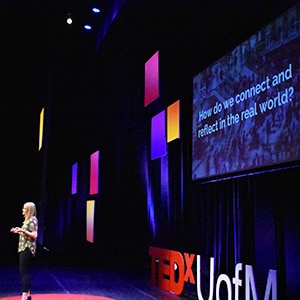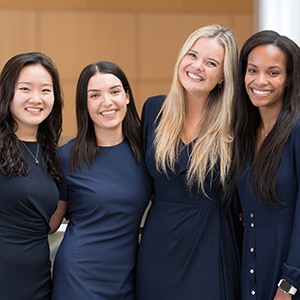Why Self-Care Isn’t Selfish
As World Mental Health Day approaches on October 10, we take a moment to reflect on the importance of taking care of our people, and would like to share the perspective of an analyst in our New York office, Sarah Wood.
Sarah opens up about her journey with mental health, and talks about how paying attention and listening to each other—while taking care of ourselves—is good for everyone, and also good for business.
In this pandemic year, it’s become very obvious that mental health and physical health are so closely intertwined. We’ve always said our people are our greatest asset—and when they can thrive to their fullest potential, it benefits our clients and our communities.
Here’s what Sarah has to say:
I grew up in a small town in Michigan where mental health was seldom discussed. As a high achiever throughout high school, I assumed I’d seamlessly transition into being a top performer in college. I didn’t realize that once on campus, surrounded by thousands of big fish from their respective ponds and every comparison magnified by social media, it would feel much like a pressure-cooker. At the time I knew how to put my head down to work hard and how to be compassionate to my peers, but I didn’t have the toolkit to be compassionate toward myself. My identity became so closely intertwined with my achievements that mistakes felt devastating. I was relentless in pursuit of perfection, but was unable to meet my unrealistic standards. For several years, I struggled with depression and disordered eating.
As I struggled with this darkness in the fall of my sophomore year, one of my professors noticed a shift in my behavior. She took a special interest in my wellbeing. Each day before class, she made the effort to ask me, “Are you okay?” and “How are you really doing?” listening closely to my answer. She saw me. She heard me. I started to come to class earlier. She made me feel like I mattered. One of the easiest and most impactful things that we can do to take care of one other is to pay attention to each other. When we make the extra effort to listen closely, we are saying, “What you say matters. You are worthy of being cared for. I care about you.” Of course, this is not a replacement for counseling or other solutions that can help improve your mental wellbeing, but it is a simple way to impact the people with whom we interact daily.
 Working with this professor, I unknowingly began to build a toolkit to override my brain’s natural negativity bias. She introduced me to yoga and meditation and encouraged me to further my practice. I am now a regular meditator (meditated for 10 days in silence on a Vipassana retreat!), yoga teacher, and a core meditation facilitator for a group called Mindful on Wall Street, a grassroots organization leading weekly meditations. I am grateful to work with the National Alliance for Mental Illness’ (NAMI) on their Young Professionals Advisory Board.
Working with this professor, I unknowingly began to build a toolkit to override my brain’s natural negativity bias. She introduced me to yoga and meditation and encouraged me to further my practice. I am now a regular meditator (meditated for 10 days in silence on a Vipassana retreat!), yoga teacher, and a core meditation facilitator for a group called Mindful on Wall Street, a grassroots organization leading weekly meditations. I am grateful to work with the National Alliance for Mental Illness’ (NAMI) on their Young Professionals Advisory Board.
Looking back now, I see that my reactions in college were natural ones. Over the years I have grown curious about understanding well-being and dove deeper into the neuroscience behind resiliency. It surprised me to learn that our brains are naturally negatively primed, though it does make sense from an evolutionary perspective. In the case of our early ancestors, a human being’s ability to survive depended on how well they could notice what was wrong or out of place (e.g. spotting a tiger hiding among trees). In our day-to-day, we aren’t dodging wild animals around each corner of our neighborhoods, this negative priming is less useful today. Left unchecked, it can have real negative consequences for how we perceive the world around us.
The word “mindfulness” is thrown around a lot, but I think most simply put, to be mindful is to notice. It takes effort to intentionally anchor your attention into the present moment. Being mindful often requires you pull your awareness out of spiraling into the past or projecting into the future. I find mindfulness to be a powerful tool for mental health, as it helps you notice the story you are telling yourself about what is happening to you. Naturally, this self-narration can be much more negative than what is actually happening. Humans are naturally meaning-making beings; mindfulness helps us call attention to the story we are writing and re-frame around the facts.
 Last year, I gave a TEDx talk about this experience of transitioning from a “joy spoiler” to a “joy soldier.” A joy soldier is someone who dedicates themselves to spreading joy in their immediate community. This complete turnaround was really only made possible by other “joy soldiers” I met along my path, including many here at Goldman Sachs.
Last year, I gave a TEDx talk about this experience of transitioning from a “joy spoiler” to a “joy soldier.” A joy soldier is someone who dedicates themselves to spreading joy in their immediate community. This complete turnaround was really only made possible by other “joy soldiers” I met along my path, including many here at Goldman Sachs.
If I've learned one thing from my experience with mental health and showing up authentically at work, it's that vulnerability begets vulnerability. The more you open up, the more you make space for others to open up as well. Many of my best friends have come from work, and I think it's because we were able to talk about these really hard things together.
Mental health is something companies don't talk about enough, but it affects everyone – either directly or indirectly (through a loved one). In the current environment, this has only become more apparent. Now more than ever, there is an undeniable overlap between matters of work and home. As we know, an organization is simply the summation of individuals. A thriving organization is possible when each individual can take care of themselves.
There is a misconception that self-care is selfish and indulgent. But I believe there is actually a compelling business case for taking care of ourselves. When we carve out the time to fill ourselves up, we can be much more patient and productive with our colleagues, better empathize and take others’ perspectives, and generate more creative solutions, because we aren’t trying to pull resources from an empty well.
 This idea is supported by neuroscience: when we are exhausted and stressed, we operate in our amygdala, the survival center of the brain. When we are well-rested and not feeling under attack, we operate in our prefrontal cortex, where we do our best creative thinking and problem solving. Thus, self-care actually optimizes the brain for high states of work. In my own experience, the more I take care of myself, the more I can show up for my team and loved ones. The hour I took to go for a run or get a full night’s sleep, produced a higher return on my work product than if I had tried to muscle my way through.
This idea is supported by neuroscience: when we are exhausted and stressed, we operate in our amygdala, the survival center of the brain. When we are well-rested and not feeling under attack, we operate in our prefrontal cortex, where we do our best creative thinking and problem solving. Thus, self-care actually optimizes the brain for high states of work. In my own experience, the more I take care of myself, the more I can show up for my team and loved ones. The hour I took to go for a run or get a full night’s sleep, produced a higher return on my work product than if I had tried to muscle my way through.
One easy practice for reframing narratives at work is called the “small wins of the day.” I’ve seen great managers implement this. In a colleague’s book club, we often will go around and share one good thing that happened that week. Similarly, a managing director I work closely with will begin meetings asking, “What is your small win of the day?” I have found this simple question changes the entire energy of the meeting, as it primes the brain for the positive and gives insight into what your colleagues value.
There are many wonderful communities here at the firm focusing on mindfulness and wellbeing. I started at Goldman Sachs in the Global Markets Division, and every Wednesday, a small group would meditate together in a conference room at 6:00 a.m. It was a powerful way to start the day, as that small investment of time set the intentionality and focus that would carry on well into the afternoon. We're working now with the Human Capital Management Division to put together a Mindfulness Network for the entire firm and connect those who care deeply about mindfulness and wellbeing, which I could not be more excited about.
To be clear, I never imagined I would talk (or write) so openly about my experience with mental health in a workplace forum. One of my mentors often says, “What is most personal is most universal,” which helped me call upon the courage to open up about this topic that is incredibly difficult to talk about. In the spirit of progress over perfection, I am deeply grateful for the opportunity to share my story. It is my humble hope that anyone who heard a bit of their own story in mine will know that they are not alone.

